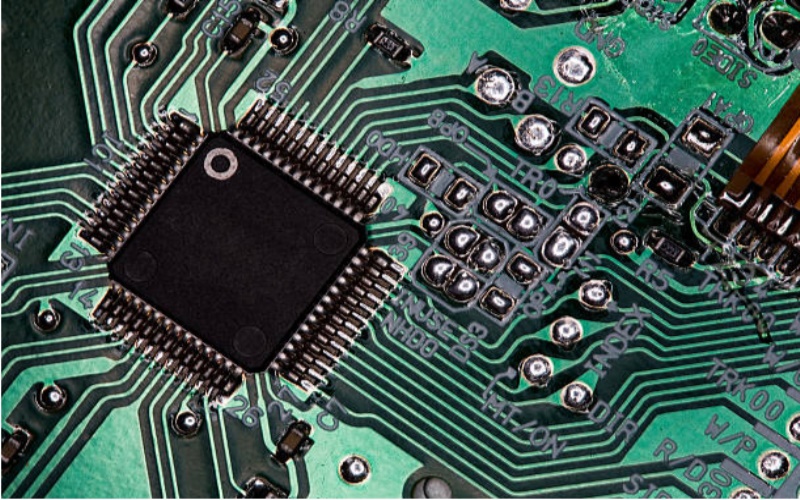In the ever-evolving landscape of technology, Integrated Circuits (IC chips) have emerged as the unsung heroes that power our digital age. These tiny electronic wonders, often smaller than a fingernail, are the backbone of modern electronics, driving innovation and breaking down barriers in various industries. This article delves into the profound impact of IC chips on technological advancements, exploring their history, functions, and the transformative role they play in shaping our interconnected world.
The Evolution of IC Chips: A Brief History
IC chips have come a long way since their inception in the 1950s. Jack Kilby, an American engineer, and Robert Noyce, co-founder of Intel, independently developed the concept of integrated circuits. Kilby’s work at Texas Instruments in 1958 led to the creation of the first integrated circuit, a groundbreaking invention that revolutionized the electronics industry.
Key Milestones:
- 1958 – Birth of the First IC Chip: Jack Kilby’s groundbreaking work at Texas Instruments results in the creation of the first integrated circuit.
- 1961 – Advancements by Robert Noyce: Robert Noyce, co-founder of Intel, further refines the IC design by developing a method using silicon wafers.
Understanding Integrated Circuits: The Building Blocks of Technology
Integrated Circuits or ICCHIPS are minuscule electronic components that consist of transistors, resistors, capacitors, and other components, all fabricated onto a single semiconductor wafer. These chips serve as the brains of electronic devices, providing the necessary processing power for various applications.
Components of an IC Chip:
- Transistors: The fundamental building blocks that amplify and switch electronic signals.
- Resistors: Control the flow of electric current within the circuit.
- Capacitors: Store and release electrical energy as needed.
- Diodes: Facilitate the one-way flow of current within the circuit.
The Versatility of IC Chips: Powering Diverse Applications
IC chips have permeated nearly every facet of our lives, driving innovation and enhancing functionality across diverse industries.
Applications of IC Chips:
- Consumer Electronics: From smartphones to smart TVs, IC chips enable the seamless functioning of various consumer gadgets.
- Medical Devices: In the healthcare sector, IC chips play a crucial role in the development of advanced medical equipment such as MRI machines and pacemakers.
- Automotive Industry: Modern vehicles rely on IC chips for engine control units, safety systems, and entertainment features.
- Communication Systems: IC chips power the network infrastructure and facilitate smooth communication in mobile phones and other devices.
Shrinking Size, Expanding Capabilities: Moore’s Law in Action
One of the remarkable aspects of IC chip technology is its adherence to Moore’s Law, formulated by Gordon Moore, co-founder of Intel. This observation predicted that the number of transistors on a chip would double approximately every two years, leading to an exponential increase in processing power.
Impact of Moore’s Law:
- Increased Processing Speed: As the number of transistors on a chip multiplies, processing speed experiences a corresponding boost, enabling faster computations.
- Miniaturization: IC chips have become smaller and more efficient, contributing to the development of compact and powerful electronic devices.
- Cost Reduction: Moore’s Law has also led to cost reductions in manufacturing, making advanced technology more accessible to a broader population.
Breaking Down Barriers: Transformative Impacts
The integrated circuit distributor have played a pivotal role in breaking down barriers in various aspects of technology, fostering advancements that were once deemed impossible.
Breaking Physical Barriers:
- Size and Weight Reduction: The miniaturization of IC chips has contributed to the development of lightweight and portable devices, making technology more accessible and convenient.
- Power Efficiency: Advanced IC chip designs prioritize energy efficiency, extending the battery life of devices and reducing environmental impact.
Breaking Technological Barriers:
- Artificial Intelligence (AI): IC chips designed specifically for AI applications have facilitated the rapid growth of machine learning and deep learning algorithms, opening new frontiers in technology.
- Internet of Things (IoT): IC chips play a crucial role in the IoT ecosystem, enabling seamless communication between interconnected devices, creating a smarter and more connected world.
Challenges and Future Prospects
While IC chips have propelled us into an era of unprecedented technological advancement, challenges persist. The race to develop even smaller, more powerful chips raises concerns about overheating and the environmental impact of electronic waste.
Challenges:
- Heat Dissipation: As IC chips become more powerful, managing heat dissipation becomes a critical challenge, necessitating innovative cooling solutions.
- Environmental Impact: The disposal of electronic waste, including outdated IC chips, poses environmental concerns. Sustainable practices and recycling efforts are essential for mitigating this impact.
Future Prospects:
- Quantum Computing: The exploration of quantum computing represents a promising avenue for the future, potentially revolutionizing computation capabilities beyond the limits of classical IC chips.
- Biological Integration: Researchers are exploring the integration of IC chips with biological systems, opening possibilities for medical implants and human-machine interfaces.
Conclusion
Integrated Circuits have been instrumental in shaping the technological landscape we inhabit today. From the early days of their invention to the current era of artificial intelligence and IoT, IC chips have broken down barriers and pushed the boundaries of what is possible. As we navigate the future, it is evident that the impact of IC chips will continue to be profound, driving innovation and ushering in new possibilities that we can only imagine today. Embracing the transformative power of IC chips, we are poised to embark on a journey of continued technological advancements, where the only constant is change, guided by the tiny marvels that are Integrated Circuits.





